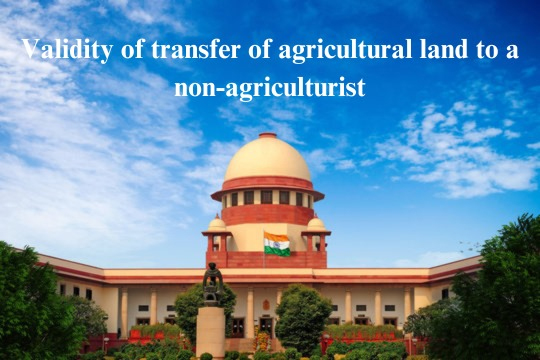Validity of transfer of agricultural land to a non-agriculturist through a testamentary disposition (i.e., ‘Will’) in the state of Gujarat
This article titled as ‘Validity of transfer of agricultural land to a non-agriculturist through a testamentary disposition (i.e., ‘Will’) in the state of Gujarat’ examines whether agricultural land can be transferred to a non-agriculturist through a testamentary disposition (i.e., a will) in Gujarat under the provisions of the Gujarat Tenancy and Agricultural Land Act, 1948 (“Act”). During the pre and post-independence era agriculturists and tenants in Gujarat have faced significant exploitation at the hands of landowners, prompting the enactment of this landmark piece of legislation. The Act was specifically designed to protect the rights and interests of agriculturists, prevent their exploitation, and foster agricultural development. By establishing a legal framework that shields tenants and agriculturalists from landowner’s excessive influence and control, it also aimed to govern the relationship between landlords and tenants. Maintaining the land’s agricultural character and keeping it in the hands of those who are actively involved in agriculture is one of the Act’s key objectives. This is critical for maintaining agricultural productivity and protecting the livelihood of agriculturists. In order to achieve this, Section 43 and 63 of the Act imposes strict restrictions on the transfer of agricultural land to non-agriculturists.
Legal provisions governing agricultural land transfers
- Section 43 of the Gujarat Tenancy and Agricultural Land Act, 1948
Section 43 of the Act imposes a non-transferability clause on certain agricultural lands, particularly those acquired by tenants under the Act. It mandates that such land cannot be transferred to a non-agriculturist without prior permission from the Collector or competent authority. The section ensures that protected lands remain with the agriculturist and cannot be transferred or alienated without following due process. It aims to prevent unauthorized transfers that could circumvent the Act’s objectives of protecting agricultural land.
- Section 63 of the Gujarat Tenancy and Agricultural Land Act, 1948
Section 63 of the Act regulates the transfer of agricultural land in Gujarat. It prohibits the sale, gift, exchange, lease, or mortgage of agricultural land to non-agriculturists, except with prior permission from the Collector. The intent behind this provision is to preserve agricultural land for agriculturists and ensure that it remains in the hands of those who cultivate in it. The restriction ensures that non-agriculturists cannot acquire agricultural land without prior approval from the competent authority.
Issues related to testamentary dispositions of agricultural land
Whether an agricultural land be transferred to a non-agriculturist through a testamentary disposition (i.e.will)?
The primary issue arises when a landowner attempts to transfer agricultural land to a non-agriculturist through a will. While a will is a testamentary document meant to express the wishes of the testator (landowner), the legal status for transferring of such agricultural land in Gujarat is strictly governed by the Act.
“The key question that arises here is whether the provisions outlined in Section 43 and 63 of the Act:
(i) distinguish between transfers made during the lifetime of the landowner and those executed upon death through a will; and
(ii) categorises both as “transfers” and impose equal restrictions on them.”
(iii) whether any living person can execute a document in contravention of any law including the Will.
Judicial Interpretation and Clarification
The issue in hand has been also placed before the Hon’ble Supreme Court in the case of Vinodchandra Sakarlal Kapadia v. State of Gujarat (2020), while deciding upon this issue the Hon’ble Supreme Court held that transferring agricultural land to a non-agriculturist through a will is not permitted without compliance with the statutory provisions of the Act. The Supreme Court clarified that the intent of the law is to protect agricultural land from falling into the hands of individuals who are not involved in agriculture. Allowing such transfers, even through a will, would defeat the purpose of the legislation.
Furthermore, the Supreme Court interpreted that a will is considered as instrument of transfer under the law, and therefore it must comply with the same restrictions imposed on sales, gifts, and exchanges. This means that a non-agriculturist cannot inherit agricultural land through a will unless the requisite permissions from the authorities are obtained. This interpretation ensures that the legislative intent of keeping agricultural land within the hands of agriculturists is preserved and attempts to circumvent these restrictions through a will are not permitted.
Conclusion: Transfer of agricultural land through a will
Based on the provisions of Section 43 and 63 of the Act, agricultural land in Gujarat cannot be transferred to a non-agriculturist through a will without obtaining the necessary prior permissions. The restrictions imposed on transfers apply equally to testamentary dispositions as they do to sales, gifts, and other forms of transfer as outlined in the Act.
In conclusion, while a landowners have the right to draft a will, the testamentary transfer of agricultural land to a non-agriculturist remains legally impermissible under the current laws in Gujarat. The primary purpose of these restrictions is to ensure that agricultural land remains with those who cultivates it, i.e., agriculturists or tenants. Any attempts to circumvent these regulations through a will would be considered invalid unless the requisite permissions are secured in compliance with the law.
The answer to question always negative whether any living person can execute a document in contravention of any law including the Will. If law do not permit and there is a prohibition to do certain thing, or there is a prohibition to do certain act except in certain manner, any document or agreement or anything in contravention to such provision of law, is illegal and invalid.
The piths and substance is that if during the lifetime of a living person, if the person is under restriction to execute certain document and thereby has no right to transfer his occupancy or no right to transfer his interest under one or other Act, he cannot execute any document, including a will showing his wish and intention in regard to such property in contravention of such law.


